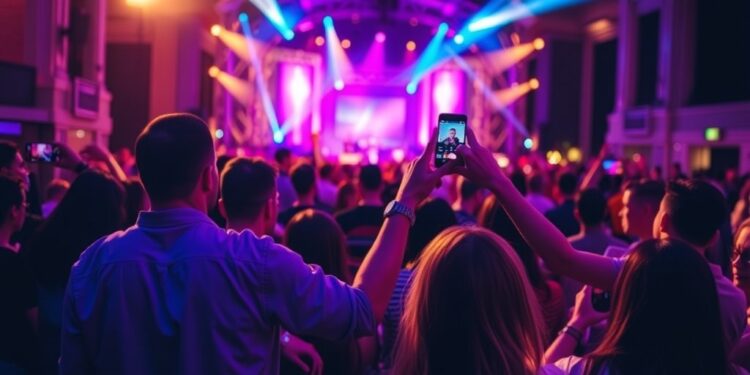In a rapidly evolving landscape where live events intertwine with social media, a fascinating study sheds light on how technology influences our experiences in real-time. This research, conducted by Esther Hammelburg from the Amsterdam University of Applied Sciences, focuses on how eventgoers engage with media technologies during large cultural events in the Netherlands, such as the Oerol Festival, 3FM Serious Request, and Pride Amsterdam. At these gatherings, participants utilize smartphones and social media platforms to capture and share their experiences in ways that shape not only their immediate enjoyment but also their future memories.
Hammelburg’s research dives into the intricate relationship between live events and mediated experiences. She interviewed 379 participants and found that many attendees arrive at events with pre-existing notions about how they plan to document their experiences. This anticipatory attitude reflects a significant psychological shift, where the act of creating memories becomes almost as crucial as the live event itself. The idea of anticipated nostalgia—a longing for future reminiscence—plays a pivotal role in how attendees mentally prepare for these occasions.
The phenomenon of visualizing future social media posts before an event highlights the deeper implications of how people connect with their surroundings. Eventgoers do not merely document moments; they curate them in ways that align with their self-image and social narratives. Hammelburg observes that attendees carry not just their devices, but also their preconceived ideas about what memories they want to construct, influenced heavily by images and posts they have previously encountered online. This results in an interesting interplay between personal memory creation and collective social storytelling.
Notably, live events are specifically designed to be extraordinary. Within the context of cultural festivals and celebrations, a heightened sense of occasion is cultivated, positioning these experiences as milestones in the lives of participants. Hammelburg’s research underscores the expectation that participants will seek out significant moments, which they can later reminisce about. This intersection of the extraordinary and the ordinary forms a bedrock for creating lasting memories.
During interviews, attendees expressed a strong desire to capture moments deemed special. This insight raises engaging questions about what criteria individuals use to define extraordinary experiences. As participants shared their thoughts, a narrative emerged that these live instances are often highlighted because they stand apart from everyday occurrences. They evolve into part of the larger narratives individuals construct about their lives, often intersecting with the collective story of the events themselves.
In this light, festivals and cultural events offer a fertile ground for memory creation. They are not only occasions for enjoyment but are also constructed as spaces where individuals deliberately participate in building memorable experiences. According to Hammelburg, this active involvement makes eventgoers co-creators in the storytelling process, blurring lines between audience and performer.
Through their engagement with technology at these events, attendees partake in a unique form of live storytelling. The narratives they craft—often intended for the eyes of others—simultaneously position them in the broader tapestry of collective memory. Each photograph or video shared on social media becomes a thread in a shared social narrative, illustrating how modern technology and cultural gatherings are inextricably linked.
The research highlights that it is not merely the act of attending these events that matters; rather, how individuals choose to document and share their experiences is laden with significance. The implications expand beyond personal memory formation; they touch upon social dynamics, cultural discourse, and the collective identity that people derive from communal experiences. This construction of memory invariably influences how eventgoers relate to each other and their environment during and after these occasions.
As more individuals integrate their smartphones into their lives, the impact on social interactions and cultural participation becomes increasingly apparent. The interplay between anticipation, experience, and memory paints a compelling picture of how we navigate our social world. The individuals Hammelburg interviewed illustrate a generation that wields technology not just as a tool for sharing but as an integral component for shaping personal and collective narratives.
In perpetuating this cycle, each event becomes a kaleidoscope of meanings and memories, shaped by the digital footprints left by attendees. Festivals and parades, by their very essence, promote a framework of shared understanding and connection among participants, compelling them to engage deeply with what they are experiencing. This active engagement, fueled by the desire to create and document memories, invites us to reconsider our role within these vibrant spaces.
As live events remain a critical part of cultural expression, acknowledging the synergy between technology and memory work reveals the sophisticated layers of our experiences. It prompts further inquiry into how these dynamics influence not just personal recollections but also the wider cultural narratives that society constructs around events. As Hammelburg’s research suggests, our conscious and subconscious strategies in shaping our memories will continue to evolve with the changing technological landscape.
Research like Hammelburg’s encourages an ongoing dialogue about our increasingly mediated lives, where technology is not merely supplementary but central to our identity and experience. As we navigate through festivals, parades, and cultural gatherings, the ability to capture the extraordinary not only enhances our enjoyment in the moment but becomes pivotal in framing how we remember and relate to significant life experiences in the future.
In essence, the fusion of live events and social media creates a dynamic landscape where memories are actively constructed and shared. This process shapes individual identities and redefines communal experiences, demonstrating the profound impact of technology on the fabric of human connection today.
Subject of Research: The impact of mediated memory work on live event experiences.
Article Title: Moments to remember: The impact of mediated memory work on live event experiences.
News Publication Date: 17-Jan-2025.
Web References: Cambridge University Press.
References: Hammelburg, E. (2024). Moments to remember: The impact of mediated memory work on live event experiences.
Image Credits: Not specified.
Keywords: Memory formation, Social media, Smartphones, Long term memory, Memory processes.




